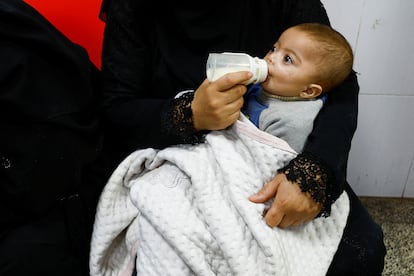Almost 16% of children in Gaza are suffering from acute malnutrition, according to the WHO
The UN agency stresses that the decline in nutrition levels in the enclave “is unprecedented worldwide” in an urgent appeal for humanitarian access


The deterioration in the nutritional status of Gaza’s population, particularly in the north, in the five months since the war between Israel and Hamas began is “unprecedented worldwide.” This is the resounding message delivered Tuesday in Geneva by the World Health Organization (WHO), the United Nations health agency, after visiting — in some cases for the first time since October 7 — several hospitals in the north of the Gaza Strip. The rate of acute malnutrition, which causes irreparable wasting or thinning, among children in the enclave has risen from 0.8% to 15.6% during this period. Ninety percent of children and 95% of pregnant and lactating women face extreme food shortages. The dramatic report, released a few hours after the publication of another U.N. report pointing to the probable sexual violence perpetrated by Hamas against the hostages, is further illustrative of the hell that life in Gaza has become.
A WHO mission gained access to two hospitals in northern Gaza: Al Shifa, where 50 children were “suffering from severe acute malnutrition,” and Kamal Adwan, further north. According to Dr. Rik Peeperkorn, WHO representative in the occupied Palestinian territories, in the pediatric unit of the latter center, which is “overflowing with patients” and to which the mission was able to gain access for the first time since October 7, 10 children have died over the last few days from hunger and dehydration. In another hospital, Al-Awda, the situation is “particularly appalling,” the senior U.N. official stressed, in an urgent appeal for humanitarian access.
According to Peeperkorn, most of the U.N. health agency’s missions to northern Gaza were denied in January, while in February “none were facilitated” because the protocol whereby combatants are notified in advance of the location of aid failed to work. “The deconfliction mechanism must continue to function so that aid can reach those who need it,” the doctor insisted. Of the 16 aid missions requested in January, only three were approved; four were “prevented” and nine were “denied,” according to the WHO representative.
Malnutrition — which causes irreparable morbid wasting or morbid thinning in young children — was never the deadly threat in Gaza that it is now, as the enclave was largely self-sufficient in fish and other food production, Peeperkorn stated. “Before the hostilities, wasting in the Gaza Strip was rare: only 0.8% of children under five suffered from acute malnutrition,” he explained. “The [current] rate of 15.6% among children aged under two in northern Gaza suggests a serious and rapid decline. Such a decline in the nutritional status of a population in three months is unprecedented globally.”
The WHO official noted with concern that 90% of children aged under two and 95% of pregnant and lactating women “face severe food poverty, meaning they have consumed two or fewer food groups [of the five considered necessary] in the previous day — and the foods they do have access to are of the lowest nutritional value.”
Sign up for our weekly newsletter to get more English-language news coverage from EL PAÍS USA Edition
Tu suscripción se está usando en otro dispositivo
¿Quieres añadir otro usuario a tu suscripción?
Si continúas leyendo en este dispositivo, no se podrá leer en el otro.
FlechaTu suscripción se está usando en otro dispositivo y solo puedes acceder a EL PAÍS desde un dispositivo a la vez.
Si quieres compartir tu cuenta, cambia tu suscripción a la modalidad Premium, así podrás añadir otro usuario. Cada uno accederá con su propia cuenta de email, lo que os permitirá personalizar vuestra experiencia en EL PAÍS.
¿Tienes una suscripción de empresa? Accede aquí para contratar más cuentas.
En el caso de no saber quién está usando tu cuenta, te recomendamos cambiar tu contraseña aquí.
Si decides continuar compartiendo tu cuenta, este mensaje se mostrará en tu dispositivo y en el de la otra persona que está usando tu cuenta de forma indefinida, afectando a tu experiencia de lectura. Puedes consultar aquí los términos y condiciones de la suscripción digital.








































